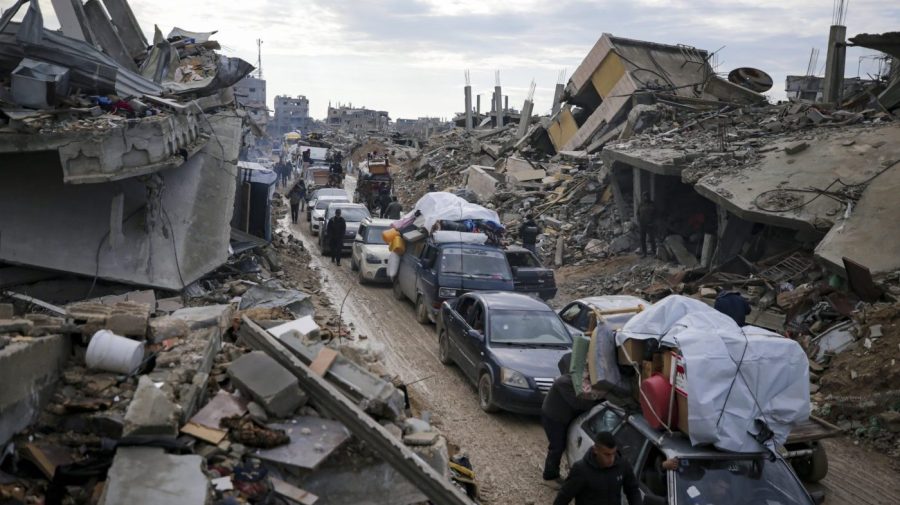
Sometimes one shouldn’t mince words: President Trump’s proposal to remove Gaza’s population and for the U.S. to “buy” the devastated seaside strip and build resorts there isn’t just impractical — it’s reckless.
In the short run, it would torpedo the release of the remaining Israeli hostages. In the long term, it would create new problems and cement the very instability Trump claims to solve, fueling radicalization and handing Hamas a propaganda victory.
Instead of such headline-chasing chicanery, what is needed is a serious, enforceable regional security arrangement — one that anchors stability in Arab-state involvement, coordinated security oversight and clear political milestones. This can be done via an American-led regional coalition supported by the EU, in which Egypt, Jordan, Saudi Arabia and the UAE are tasked with neutralizing extremist threats, enforcing borders and overseeing an orderly Israeli withdrawal from agreed Palestinian territories. The long-term aim would be accountable self-governance for Palestinians and a clear and recognized border between them and Israel.
At the core of such a vision is an alliance that would act as a stabilizing force, countering terror and violence. A timely, longed-for framework for Middle East security, normalization and, eventually, peace is indispensable. This is not merely an aspirational proposal, but a plan driven by pragmatism, carefully designed for implementation.
Regional actors must take ownership of security enforcement, as history has proven that external intervention alone cannot sustain peace. By integrating intelligence-sharing, counterterrorism operations and strategic oversight, this framework would allow Palestinian governance to develop under strict security guarantees, reducing risks for all involved. Egypt and Jordan — both with longstanding peace agreements with Israel — would serve as primary stakeholders, overseeing key security developments and ensuring Palestinian factions adhere to clear, enforceable commitments.
This phased approach to Israeli-Palestinian disengagement within a regional security-oriented coalition establishes a realistic, benchmarked timeline for transitioning from conflict to statehood.
The first step is immediate stabilization: ending hostilities in Gaza, securing the release of all Israeli hostages and deploying an international security oversight mission to prevent future escalations. Next, governance and security reforms must take root.
A restructured Palestinian Authority, with oversight from the regional coalition, would gradually assume control over Gaza (and also the West Bank), ensuring law and order through internationally supervised security forces. Disarmament of extremist factions — Hamas and Islamic Jihad included — and the creation of a transparent, internationally managed reconstruction fund for Gaza would be essential components, ensuring that financial resources are used for rebuilding rather than for fueling conflict.
As these security and governance measures take hold, mutual recognition between Israel and the Palestinian entity would be formalized within a structured, time-bound negotiation process. The end goal is clear: an agreed-upon, defensible border between Israel and a demilitarized Palestinian state. This process aligns with principles outlined in the Arab Peace Initiative and key U.N. Security Council resolutions, grounding it in both regional and international legitimacy. The framework would also foster normalization between Israel and Arab states, tying economic and political incentives to continued progress in Palestinian state-building, capabilities and security compliance.
Meanwhile, Trump’s call for evacuating Gaza’s population ignores both practical and moral realities. Such a move would not only provoke international outrage but also create a permanent refugee crisis that would destabilize the entire region, providing extremist groups with fresh grievances to exploit.
In contrast, a well-structured regional security framework would move beyond short-term crisis management and offer a credible, gradual path to a final-status agreement that is both enforceable and sustainable. A robust oversight mechanism and binding dispute resolution would ensure measurable progress as to monitoring and implementation.
By embedding Israeli-Palestinian separation within a broader regional security and diplomatic framework, this plan shifts the paradigm from conflict management to conflict resolution. It ensures that Israeli, Arab and Palestinian interests are addressed while reinforcing U.S. influence in the Middle East.
True leadership demands more than impulsive suggestions; it requires strategic vision. The U.S. should seize this opportunity to shape the Middle East’s future. The region can no longer afford empty promises and pointless distractions.
Gilead Sher is a former Israeli prime minister’s chief of staff and senior peace negotiator. He is a fellow in Middle East peace and security at Rice University’s Baker Institute. His last book, “Reflections on Conflict Resolution,” was published in 2022.











